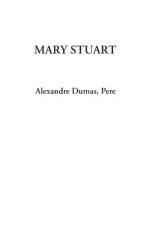“You are exacting, my lord,” said the queen: “you would scarcely have the right to expect that from me if I were in full liberty on the other side of the lake and surrounded with a faithful escort; but between these walls, behind these bars, in the depths of this fortress, I shall not tell you that I sign voluntarily, lest you should not believe it. But no matter, you want my signature; well, I am going to give it to you. Melville, pass me the pen.”
“But I hope,” said Lord Ruthven, “that your Grace is not counting on using your present position one day in argument to protest against what you are going to do?”
The queen had already stooped to write, she had already set her hand to the paper, when Ruthven spoke to her. But scarcely had he done so, than she rose up proudly, and letting fall the pen, “My lord,” said she, “what you asked of me just now was but an abdication pure and simple, and I was going to sign it. But if to this abdication is joined this marginal note, then I renounce of my own accord, and as judging myself unworthy, the throne of Scotland. I would not do it for the three united crowns that I have been robbed of in turn.”
“Take care, madam,” cried Lord Lindsay, seizing the queen’s wrist with his steel gauntlet and squeezing it with all his angry strength—“take care, for our patience is at an end, and we could easily end by breaking what would not bend.”
The queen remained standing, and although a violent flush had passed like a flame over her countenance, she did not utter a word, and did not move: her eyes only were fixed with such a great expression of contempt on those of the rough baron, that he, ashamed of the passion that had carried him away, let go the hand he had seized and took a step back. Then raising her sleeve and showing the violet marks made on her arm by Lord Lindsay’s steel gauntlet,
“This is what I expected, my lords,” said she, “and nothing prevents me any longer from signing; yes, I freely abdicate the throne and crown of Scotland, and there is the proof that my will has not been forced.”
With these words, she took the pen and rapidly signed the two documents, held them out to Lord Ruthven, and bowing with great dignity, withdrew slowly into her room, accompanied by Mary Seyton. Ruthven looked after her, and when she had disappeared, “It doesn’t matter,” he said; “she has signed, and although the means you employed, Lindsay, may be obsolete enough in diplomacy, it is not the less efficacious, it seems.”
“No joking, Ruthven,” said Lindsay; “for she is a noble creature, and if I had dared, I should have thrown myself at her feet to ask her forgiveness.”
“There is still time,” replied Ruthven, “and Mary, in her present situation, will not be severe upon you: perhaps she has resolved to appeal to the judgment of God to prove her innocence, and in that case a champion such as you might well change the face of things.”




